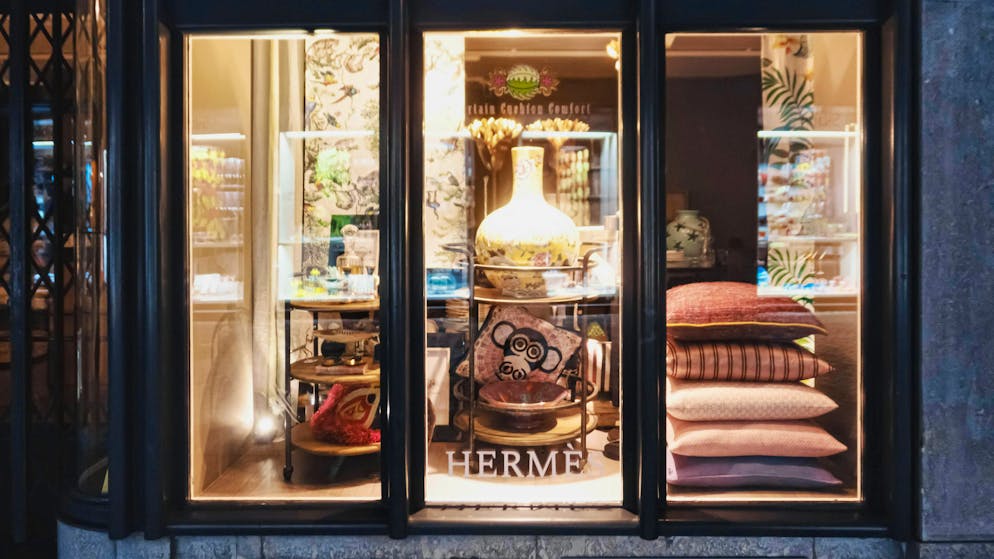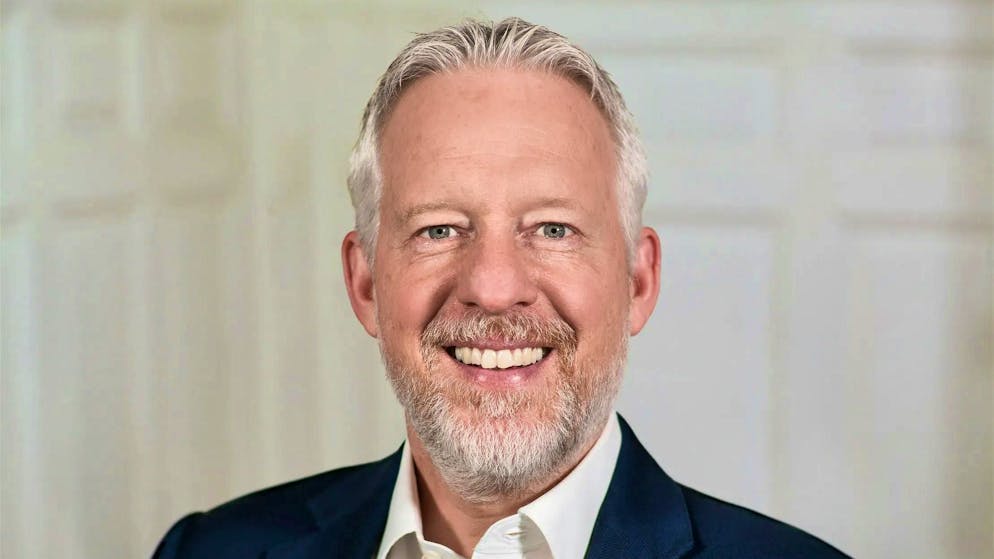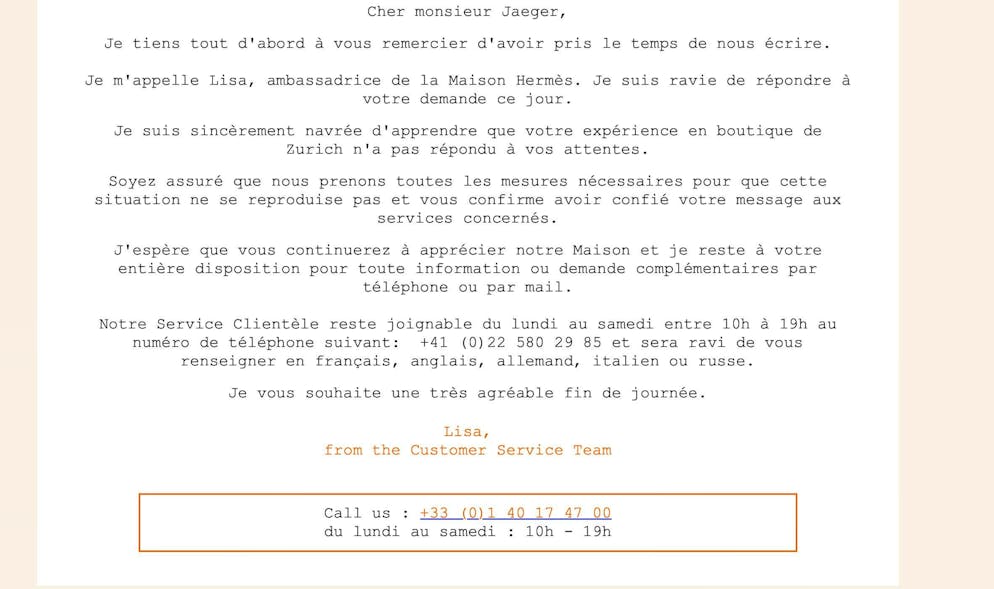Swiss celebrity chef was not served Is unfriendliness part of the concept in Zurich luxury stores?
Bruno Bötschi
12.10.2024

Different rules apply when shopping in luxury boutiques. It is also claimed that if sales assistants behave in a dismissive manner, the desire for the products increases. Is this really true? blue News asked.
No time? blue News summarizes for you
- In the luxury boutiques on Bahnhofstrasse in Zurich, different rules apply to sales.
- Two aspects are particularly important for luxury labels: telling a credible story about the brand - and reducing the range.
- We often read that sales assistants in luxury label stores behave in a dismissive manner in order to increase consumer desire.
- What happened to Swiss celebrity chef André Jaeger in the Hermès store in Zurich this week fits in well with this story. Jaeger wanted to buy a 1000-franc crockery set there as a gift for friends, but instead he wasn't served.
- Hermès has set new standards in terms of scarcity, says luxury expert Markus Kramer.
- "The fact that a certain distance from luxury brands can even increase the desire for their products is psychologically sound," says Kramer in an interview with blue News.
Two aspects are particularly important for luxury labels: telling a credible story about the brand - and reducing the range.
When it comes to scarcity, Hermès has set new standards, says Markus Kramer. With his agency, the luxury expert advises companies that want to change their image or at least refine it.
It was recently reported in the media that Hermès had refused two customers the purchase of a "Birkin Bag". The bag, named after the actress Jane Birkin, costs over 100,000 francs depending on the model.
It is also repeatedly reported that sales assistants in luxury label stores behave in an unfriendly and dismissive manner in order to further increase consumer desire.
What happened to André Jaeger this week in the Hermès store on Bahnhofstrasse in Zurich fits in well with this story. The Swiss celebrity chef wanted to buy a 1000-franc crockery set there as a gift for friends.
Things turned out differently than expected. Jaeger felt badly treated when he visited the Hermès store. He left the store without any crockery - and later vented his frustration on social media and on blue News.
Mr. Kramer, what does luxury mean?
Luxury goes far beyond the material. It's about the depth that can create a connection to emotions and values. The feeling of uniqueness, exclusivity and timeless quality. True luxury is not defined solely by price and status, but by the meaning that people attach to a thing or an experience. It is also about respect and the feeling of mutual appreciation: the customer towards the brand and the people behind it. And, of course, the brand towards the customer.
Swiss celebrity chef André Jaeger wanted to buy a set of tableware in the Hermès store on Bahnhofstrasse in Zurich. After he was not served, even though there was only one other customer in the store, he left the luxury boutique without having achieved anything.
The simple answer, and with the proviso that the facts are correct: Something went wrong.
For me, the employees' behavior has to do with a lack of decency.
Luxury should always go hand in hand with respect and appreciation, whether in dealings with customers, employees or the people who make the luxury products. Even if it is true that even as a good customer you don't always get everything - even if you want it or have the money - that is no reason to ignore these principles.
In retail, i.e. in boutiques, and in the online sector, it is often not clear at the beginning who is a customer, who might become a customer or who will never become a customer. But there are clear procedures and processes in place to prevent such situations from arising in the first place.
With your agency Brand Affairs, you advise companies that want to improve their image. We often read that luxury labels such as Hermès, Prada and Louis Vuitton are making their products extra scarce. Why do they do this?
By deliberately limiting their products, luxury brands increase their exclusivity and thus their desirability. The idea is to show that these products are not available to everyone, but represent a special rarity. This approach uses psychological mechanisms such as the "FOMO" principle (editor's note: Fear of Missing Out) and can strengthen the brand. Because what you can't have is desirable.
Rationed luxury, i.e. a deliberate economy of scarcity: is it true?
Yes, to a certain extent it is. Luxury brands deliberately use the scarcity of their products to create an exclusive aura around their brands. However, this often only applies to so-called "halo" products.
This creates attention with a few, extreme products, which then lends the entire brand radiance - and thus also the 99 percent of products, which are then much cheaper and also more accessible. However, these principles are no longer just used by luxury brands.

Are luxury labels afraid that if too many customers* can afford one of their expensive bags, the paint will peel off and they will become mass-produced goods?
Yes, absolutely. Luxury thrives on the feeling of something special. If a luxury product becomes too widespread, it loses its exclusivity and therefore its appeal for many customers. It's always a balancing act for luxury brands - you want to sell more, but never at the cost of losing desirability. They know very well that the value, price and therefore the margin of a product depends heavily on how exclusive it is perceived to be. That's why less is often actually more for luxury brands.
Last April, you said in the Tages-Anzeiger newspaper about the Hermès store in Zurich: "The employees here don't sell you anything, you buy something from them."
By this I mean the special dynamic in luxury stores, where the customer doesn't have the feeling of being actively courted, but rather has to make an effort to gain access to a product themselves. There is often a feeling that it is a privilege to even have the opportunity to purchase something. The sellers are not selling a "transaction" for money, they are offering advice with a great deal of expertise.
So does that mean that if luxury goods sellers behave in an unfriendly and dismissive manner, consumers' desire for their products increases all the more?
No, it has nothing to do with being unfriendly or dismissive. It's more about how it's done. The principle behind it is called distance. It starts with the clothing, continues with the aforementioned iPad and ends with the barrier cord in front of the entrance door: You have to be willing to wait. This creates a feeling of exclusivity.

The fact that a certain distance from luxury brands can even increase the desire for their products is psychologically sound. This tactic also plays on the idea that people desire things more when they are harder to come by.
However, it is a fine line: it only works as long as the customer still feels valued. If you cross this line, the experience can turn negative and cause damage, as was the case with André Jaeger. But it should never be about behavior. It remains polite and friendly.
Are luxury labels exploiting a human weakness of character by making their products scarce?
Yes and no. Yes, you could say that luxury brands are exploiting a human trait, namely the desire for the rare and special. But no, I don't see this as a weakness, but rather as a deep human longing for individuality and differentiation. Luxury brands respond to this by specifically addressing these needs and strengthening the feeling of special belonging.
Gastronome André Jaeger no longer wants to buy Hermès products in future. So does the phrase "You have to expect to lose" apply to luxury labels?
Luxury brands know that their target group is very selective and that they can rely on the quality and exclusivity of their products to remain in demand. Yes, the loss of a customer like André Jaeger is unfortunately a possible consequence. The strategy of scarcity and exclusivity means that brands accept that not every potential customer will become a customer.
That's tough, but it reflects reality, otherwise the business model wouldn't work at all. However, such a loss can be problematic if it damages the brand's reputation, as word of mouth and negative reporting can have a big impact in today's connected world. The key here is to find the right balance and react immediately if something goes wrong.
After his unpleasant shopping experience, André Jaeger wrote Hermès an email. As a result, he was fobbed off with a standard apology.
What a shame. A meaningless response to a dissatisfied customer is always a missed opportunity, whether a luxury brand or not. In luxury, you expect the brand to personally take care of their customers' feedback and respond to such incidents in an empathetic and solution-oriented manner.

At least the reply is personal, with a name, contact details and the promise of an internal follow-up - perhaps something can still be salvaged. It would at least give Hermès the opportunity to try to make amends for the incident and perhaps even regain Mr. Jaeger's trust.
How important is luxury to you personally?
That is a question of definition. I'm currently on my way on vacation with my daughter. We decided yesterday and are leaving today. For me, luxury is a question of quality, time and space for the essentials. For me, luxury means taking the freedom to do things consciously and enjoy them.
This can be a good conversation, the purchase of a handmade product, but also simply a moment of peace for yourself. For me, luxury is less a question of possession than of conscious experience and appreciation. Is that important to me? Yes, I would say it is part of my foundation.




